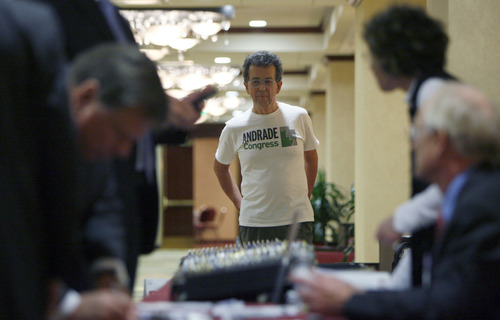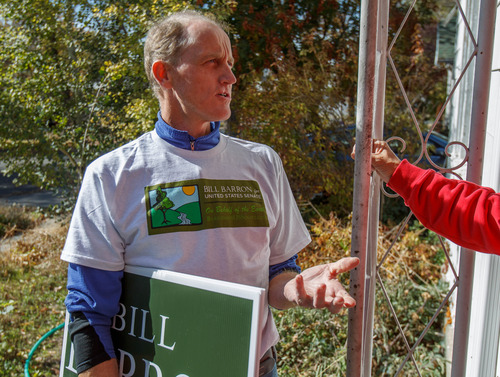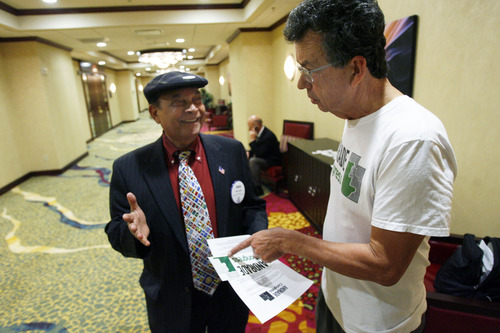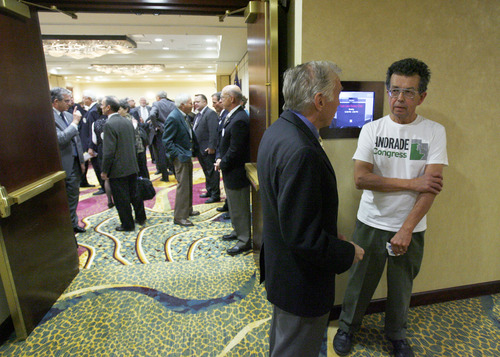This is an archived article that was published on sltrib.com in 2012, and information in the article may be outdated. It is provided only for personal research purposes and may not be reprinted.
In many ways, Joe Andrade has been the noisy nag of independent candidates trying to get their message out.
The independent candidate for Utah's 2nd Congressional District race has organized protests outside television studios and hotels where debates have taken place between the Republican and Democratic candidates.
He's written letters, complained on social media and even flagged down former KCPW morning show host and news director Jeff Robinson to moderate a debate between all five candidates in his congressional race.
Robinson said Andrade was "one of the most active independent candidates" he'd seen in Utah politics and asked instead if the former University of Utah professor would be willing to participate in a forum featuring all third-party independent candidates.
"He was very open to it," Robinson said. "Very enthusiastic."
Andrade, who stood outside the Salt Lake City Marriott protesting his exclusion from the Rotary Club-moderated debate Tuesday between Democrat Jay Seegmiller and Republican Chris Stewart said he was doing it for reasons bigger than himself.
"It's an experiment in democracy," Andrade said. "I intend to write it up after it's over so it can used as a hand guide for candidates down the road."
—
Money politics • Utah's 2nd Congressional District race has been dominated financially by Stewart, the Republican, who picked up more than $390,000 for the campaign to date. His chief rival, Democrat Jay Seegmiller, is far behind Stewart with a little more than $98,000 raised.
The other three candidates in the race — Andrade, Charles Kimball and Jonathan Garrard — have raised no money, according to Federal Election Commission (FEC) filings.
The trio of congressional candidates caught a break last week, however, when Utah Public Radio hosted a debate with all the candidates in Cedar City. It was a rare opportunity to go toe-to-toe with the major party hopefuls.
It's been tougher for the two independent candidates in the U.S. Senate race, where Democrat Scott Howell faces an uphill fight against long-time incumbent Sen. Orrin Hatch and where the incumbent this year has outraised his challenger $8.1 million to $243,000.
Both totals dwarf Bill Barron's haul of $15,497. Candidate Daniel Geery hasn't raised any money.
In debates, Barron and Geery did get a chance to debate with Howell on at least one occasion, but Hatch has never showed up for one featuring all the candidates.
But in the 4th Congressional District — the highest-profile race in the state — Libertarian candidate Jim Vein can't get within sniffing distance of a debate.
Vein said he's been excluded at all debates between Republican Mia Love and U.S. Rep. Jim Matheson, D-Utah.
He largely blames the media for the exclusion — calling the rules that keep him out arbitrary. But he also said he'd like to see spending caps on future elections to balance the playing field. The race between Matheson and Love has already topped $10 million.
"We really need to revamp the system," Vein said. "The money being spent by the Super PACs and campaigns makes is extremely difficult to compete."
The 53-year-old construction worker is instead putting up signs and knocking on doors to get out his Libertarian message of less government and congressional term limits.
"People are tired of the same," he said. "They don't want Matheson or Love. With me, I won't vote straight party."
—
Pre-packaged • Matthew Burbank, associate professor of political science at the University of Utah, said it's a common refrain; people are tired of only two choices, but they keep making the same two choices repeatedly.
"If you're a Republican or Democrat, you know what you're getting," he said. "If you have someone who is an independent, it's harder because you have to find out who they are. You don't get a packaged view and have to know where they fit on the spectrum on different topics. And that's a problem for most voters because they can't take the time to do that research."
Burbank also said the system automatically favors Republicans and Democrats because the parties craft the rules.
He also said voters tend to attach more credibility to candidates that have had to run a primary gantlet to secure the nomination rather than a third-party candidate who files paperwork with the FEC.
Sometimes the independent candidates run one-note campaigns or appear to be on the fringe. Barron, for example, is running on protecting the environment and has offered little in policy on a wide range of other topics.
Garrard said at a debate last week his views were shaped and inspired by anti-communist and John Birch Society supporter Cleon Skousen.
Burbank said the most likely pathway for a third party to break through would be for one of the major parties to splinter off, taking with it some high-profile names with built-in fundraising ability. But he said he didn't see that happening.
"The tea party could have gone that way and had instant credibility," he said. "In essence, they would've said 'If you really want to be conservative, we're your party.' They could have easily staked out that territory."
Instead, he said they opted to keep it within the Republican Party and said "There wasn't really any effort" to turn it into a bona fide third-party movement.
—
Trail blazer • Kimball, who is running in the 2nd Congressional District, said his inspiration to drive more than 8,000 miles around the large district and meet voters came from Ralph Waldo Emerson. The essayist and poet wrote: "Do not follow where the path may lead. Go instead where there is no path and leave a trail."
Kimball, who is originally from Maine but has lived in Salt Lake City for two decades, said he wants to inspire people to vote for him and break out of the two-party mold.
"If I give you pause for moment and [you] said, 'I want to think about that or know more about that particular point' or if I express something beyond what makes you comfortable or if I get you to recognize you have a stake in how this country moves forward, then I want you to consider voting for me," Kimball said.
"This process has been incredibly cathartic for me. I feel like I'm vested in democracy now."
Twitter: @davemontero —
Third party and independent candidates
President • Jill Stein, Green Party; Ross C. "Rocky" Anderson, Utah Justice Party; Virgil Goode, Constitution Party; Gary Johnson, Libertarian Party
U.S. Senate • Shaun Lynn McCausland, Constitution; Daniel Geery, Utah Justice Party, Bill Barron, Unaffiliated
U.S. House 1 • Sherry Phipps, Constitution
U.S. House 2 • Jonathan D. Garrard, Constitution; Joseph Andrade, Unaffiliated
U.S. House 4 • Jim L. Vein, Libertarian
Governor • Brandon W. Nay, Constitution; Ken Larsen, Libertarian
Attorney General • W. Andrew McCullough, Libertarian
State Auditor • Richard Proctor, Constitution
State Treasurer • Vincent C. Marcus III, Libertarian
* Does not include write-in candidates











